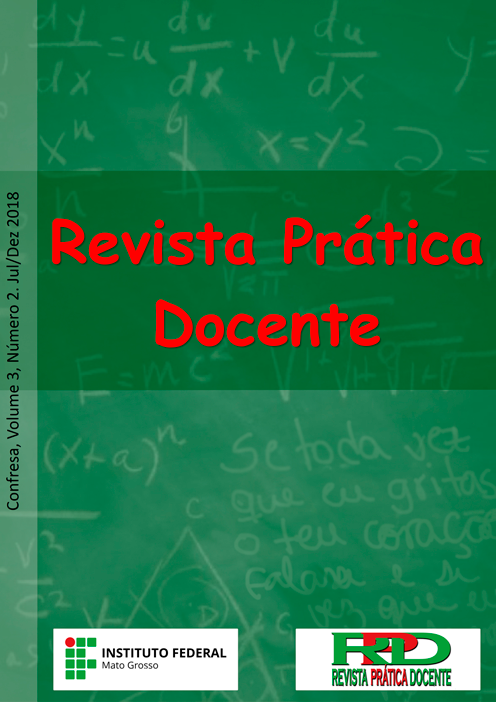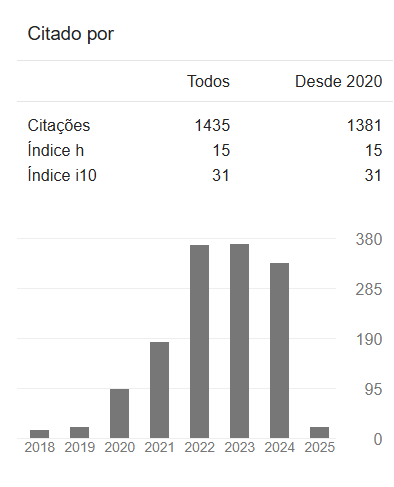INTEGRATING EDUCOMMUNICATION AND GAMIFICATION AS A STRATEGY TO TEACH SUSTAINABILITY AND HEALTHY EATING IN THE 5TH YEAR OF ELEMENTARY SCHOOL
DOI:
10.23926/RPD.2526-2149.2018.v3.n2.p595-609.id259Keywords:
Educommunication, Gamification, Student protagonism, Basic education, Digital technologiesAbstract
Sustainability and Healthy Eating are important topics that are often discussed in the school environment. However, rather than just addressing these issues, it is necessary to help students attribute meaning to them, so that learning can be observed in compatible attitudes daily. This article describes a practice carried out in a municipal public school with 53 students in the 5th year of elementary school, with which the topics Sustainability and Healthy Eating were approached in a project that comprised ten sequential classes developed in the Computer Laboratory and in the school yard. The activities included the work with educommunication through the discussion of television reports, gamification through a QR Code hunting and an activity with Kahoot and the protagonism of the students, who after the initial activities developed an awareness campaign on the topic in the school. The students' motivation and commitment to perform the activities are among the main results achieved and, consequently, a better understanding of the contents occurred, reflecting changes in attitudes towards the care of the environment and healthy eating that could be observed in school and family life.
Downloads
Metrics
References
ANDRADE, Jessica Gonçalves de; SCARELI, Giovana. Educomunicação: Práticas e Perspectivas – Uma Análise das Ações do Instituto recriando em Sergipe. In: SIMPÓSIO EDUCAÇÃO E COMUNICAÇÃO, 3., 2012, Aracajú. Anais. Aracajú: Unit, 2012. p. 435 - 446. Disponível em: <http://geces.com.br/simposio/anais/anais-2012/Anais-435-446.pdf>. Acesso em: 30 ago. 2018.
ANJOS, Mayara Abadia Delfino dos. Rádio Romeiro e o Uso da Educomunicação na Festa de Nossa Senhora da Abadia em Romaria. Revista Triângulo, Minas Gerais, v. 6, n. 2, p. 16-27, 2013. Disponível em: <https://bit.ly/2wp9mvi > Acessado em: 28 ago. 2018.
CARVALHO, Ana Amélia A. Apps para ensinar e para aprender na era mobile-learning. In: CARVALHO, Ana Amélia A. (Org.). Apps para dispositivos móveis: manual para professores, formadores e bibliotecários. Lisboa: Ministério da Educação de Portugal, 2015. Cap. 1. p. 9-18. Disponível em: <https://bit.ly/2lFBiXd>. Acesso em: 11 mar. 2018.
CRUZ, Sónia. QR Code: um código que pode dizer muito. In: CARVALHO, Ana Amélia A. (Org.). Apps para dispositivos móveis: manual para professores, formadores e bibliotecários. Lisboa: Ministério da Educação de Portugal, 2015. Cap. 1. p. 259-268. Disponível em: <https://bit.ly/2lFBiXd>. Acesso em: 20 ago. 2018.
DAI, Alvaro; STRIEDER, Dulce Maria. A horta escolar como espaço de aprendizagem no ensino de Ciências: relato de experiência. In: MALACARNE, Vilmar; STRIEDER, Dulce Maria. (Org). O Ensino de Ciências e Matemática: Concepções e práticas. São Leopoldo: Trajetos Editorial, 2017. p. 37-61.
DELLOS, Ryan. Kahoot! A digital game resource for learning. International Journal of Instructional Technology and Distance Learning, Pennsylvania, v. 12, n. 4, p.59-52, abr. 2015. Disponível em: <https://goo.gl/UJirTi>. Acesso em: 11 ago. 2018.
GUIMARÃES, Daniela. Kahoot: quizzes, debates e sondagens. In: CARVALHO, Ana Amélia A. Apps para dispositivos móveis: manual para professores, formadores e bibliotecários. República Portuguesa: Ministério da Educação Direção-geral da Educação, 2015. p. 203-224. Disponível em: <https://bit.ly/2lFBiXd>. Acesso em: 30 ago. 2018.
LOURENÇO, Silene de A. G. Educomunicação e Currículo Escolar. In: II CONGRESSO MUNDIAL IBERO-AMERICANO (CONFIBERCOM), 2014, Braga. Anais do II Congresso Mundial Ibero-Amerciano (Confibercom). Braga: Confibercom, 2014. v. 1. p. 776-783.
MALUSÁ, Silvana; QUEIROZ Adolpho; SILVA, Adriene Sttéfane; MOURA, Maria Aparecida da Silva. Pedagogia de Projetos e Educomunicação: Uma Parceria de Sucesso. Revista Latinoamericana de Ciencias de la Comunicación, v. 14, n. 27, 2017. Disponível em: <https://www.alaic.org/revista/index.php/alaic/article/view/1029/494> Acessado em: 24 ago. 2018.
MORAN, José. Metodologias ativas para uma aprendizagem mais profunda. In: BACICH, Lilian; MORAN, José (Org.). Metodologias ativas para uma educação inovadora: uma abordagem teórico-prática. São Paulo: Penso, 2018. Parte. 1. p. 1-25
SANTOS, Paulo Roberto dos. O Ensino de Ciências e a Ideia de Cidadania. In: Mirandum, ano X, n. 17, p. 25-34 – IJI – Universidade do Porto (Portugal): Ed. Mandruvá. 2006. Disponível em <http://www.hottopos.com/mirand17/index.htm>. Acesso em: 08 out. 2017.
SILVA, Denis Antônio; DIAS, Raquel R.; Flippert, Vania de Fátima T.; BOSCARIOLI, Clodis. Usando Smartphones, QR Code e Games of Thrones para gamificar o Ensino e Aprendizagem de Termometria. Anais do XXIII WORKSHOP DE INFORMÁTICA NA ESCOLA (WIE 2017), Recife, p.658-666, out. 2017. Disponível em: <https://goo.gl/E4BA67>. Acesso em: 11 ago. 2018. DOI: https://doi.org/10.5753/cbie.wie.2017.658
SILVA, Priscila Kalinke da. A Educomunicação Como Recurso Para A Educação Para Os Meios. Vidya, Santa Maria, v. 30, n. 1, p.61-69, jun. 2010. Disponível em: <https://www.periodicos.unifra.br/index.php/VIDYA/article/viewFile/301/276>. Acesso em: 30 ago. 2018.
VIEIRA, Liliana de Sousa; COUTINHO, Clara Pereira. Mobile learning: perspectivando o potencial do QR Code na Educação. RepositórioUM, Porto, p.73-91, mar. 2013. Disponível em: <https://goo.gl/bRqyow>. Acesso em: 11 ago. 2018.
WALASWICK, Raul Sidnei. Metodologia de pesquisa para Ciência da Computação. Rio de Janeiro: Editora Elsevier, 2009.
Downloads
Published
How to Cite
Issue
Section
License
Copyright (c) 2023 A Revista Prática Docente tem o direito de primeira publicação

This work is licensed under a Creative Commons Attribution-NonCommercial 4.0 International License.
Authors who publish in this journal agree to the following terms:
- Authors retain the copyright and grant the journal the right of first publication, with the paper simultaneously licensed under the Licença Creative Commons Attribution allows the sharing of the work with acknowledgment of authorship and initial publication in this journal.
- Authors are authorized to take additional contracts separately, for non-exclusive distribution of the version of the work published in this journal (e.g. publish in institutional repository or as a book chapter), with acknowledgment of authorship and initial publication in this journal.











